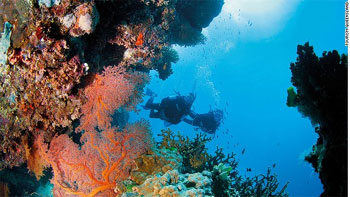When will these destructive proposals ever stop?
With Australia’s Great Barrier Reef already in jeopardy, it’s amazing that one of the world’s great natural treasures would be put under further threat.
Australia’s Great Barrier Reef "watchdog" has approved a dredging permit to build the world’s biggest coal port. Some 3 million cubic meters of mud will be dumped at the foot of the world’s healthiest and most extensive coral reef – so vast it can be seen from space.
Besides dumping a mountain of mud bigger than the Great Pyramid of Giza – once the coal port is expanded, shipping traffic through the reef will double, increasing pollution and the risk of accidents.
"The corals could stop growing or potentially die, depending on how long the mud stays there," Louise Matthieson from Greenpeace Australia told Reuters.

Australia is now set to double coal exports, overtaking Indonesia as the world’s biggest coal exporter. If the permit had been denied, it was doubtful the port would have been built because of low coal prices and lack of financing.
While the port could be worth $28 billion in coal sales, the reef is one of Australia’s biggest tourism draws, bringing in $5.7 billion a year. Not that it’s about money, considering the biodiversity that’s harbored there.
The Great Barrier Reef Marine Park Authority, which gave the permit, is the government agency charged with protecting the reef. Since the right-wing government took over last year, that "protector" has already approved some dredging for coal exports.
"The real politics of the situation is they have a new environment minister who expects them to toe the line," Matthieson told Reuters.
Bruce Elliot, the Authority’s General Manager for Biodiversity, Conservation and Sustainable Use, insists the 47 environmental safeguards they have in place will protect the reef.
Newly released documents show the Authority repeatedly advised the Environment Department to reject the dredging and dumping proposal:
- they were preparing to refuse dumping permits because there were alternatives to dredging at that scale
- the water quality offset plan is "unrealistic" and "unachievable"
- dumping at sea would be inconsistent with Australia’s obligations under international treaties to prevent marine pollution.
They said, "The proposal to dredge and dispose of up to 1.6 million cubic meters of sediment per year … has the potential to cause long-term irreversible harm to areas of the Great Barrier Reef Marine Park … in particular seagrass meadows and nearby coral reefs …
In 2012, before this government took over, Australia set aside a third of its ocean – the size of India – to create the world’s largest network of marine parks. Its crown jewel is protection of the Coral Sea which surrounds the Great Barrier Reef.
"The Coral Sea is one of the last remaining places on Earth with healthy populations of large ocean-voyaging species, such as deepwater sharks, tuna, and marlin," says Imogen Zethoven of the Pew Environment Group.
UNESCO is considering putting the Great Barrier Reef on its "in danger" list or could even cancel its World Heritage listing.
